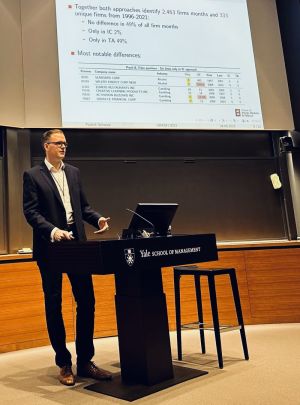
EDHEC Research on Investor Impact featured at annual GRASFI conference
Written on 01 Sep 2023.

The sixth annual conference of the Global Research Alliance for Sustainable Finance and Investment (GRASFI), held at Yale University, featured presentations of new research perspectives on investor impact developed by researchers associated with EDHEC Business School.
Investor impact, in the context of sustainable investing, refers to the effect that an investor's investment management decisions—such as asset allocation or stewardship—have on the environmental and social performance of invested or investable entities. Positive investor impact may come from the mitigation of activities with negative impacts, the acceleration of activities with positive impacts, or improvements in the non-financial performance of activities.
 EDHEC Ph.D. in Finance graduate Jonathan Harris introduced a fresh perspective on investor impact through a unique asset pricing model. Defining investor impact as the changes in non-market outcomes brought about by investor actions, Harris’ paper examines the intricate relationship between investor behavior, asset prices, and environmental/social consequences. He employs price elasticities of supply and demand to establish contribution multipliers for assets, reflecting the extent to which shifts in investor demand influence supply and subsequently, investor impact. This approach reveals considerable cross-sectional variation in the contribution multipliers and covariance with expected financial returns. The paper derives a theoretical valuation formula for investor impact and explores optimal portfolios, based on the principle that asset prices should accurately reflect potential investor impact. Empirical findings indicate substantial potential for investor impact, even in highly liquid assets. Yet the level of the contribution multiplier makes it hard to reconcile observed ESG-driven demand shifts with impact preferences. The author observes that divestment can be coherent with impact preferences given a sufficiently high price of impact. Ideal impact investments are large, positive allocations to profitable, socially productive assets with elastic supply and inelastic demand. These findings have implications for how the pursuit of investor impact is managed, researched, and regulated.
EDHEC Ph.D. in Finance graduate Jonathan Harris introduced a fresh perspective on investor impact through a unique asset pricing model. Defining investor impact as the changes in non-market outcomes brought about by investor actions, Harris’ paper examines the intricate relationship between investor behavior, asset prices, and environmental/social consequences. He employs price elasticities of supply and demand to establish contribution multipliers for assets, reflecting the extent to which shifts in investor demand influence supply and subsequently, investor impact. This approach reveals considerable cross-sectional variation in the contribution multipliers and covariance with expected financial returns. The paper derives a theoretical valuation formula for investor impact and explores optimal portfolios, based on the principle that asset prices should accurately reflect potential investor impact. Empirical findings indicate substantial potential for investor impact, even in highly liquid assets. Yet the level of the contribution multiplier makes it hard to reconcile observed ESG-driven demand shifts with impact preferences. The author observes that divestment can be coherent with impact preferences given a sufficiently high price of impact. Ideal impact investments are large, positive allocations to profitable, socially productive assets with elastic supply and inelastic demand. These findings have implications for how the pursuit of investor impact is managed, researched, and regulated.
Pricing Investor Impact by Jonathan Harris

Ph.D. candidate Patrick Schwartz from the University Duisburg-Essen Chair of Finance presented joint work with EDHEC Business School Associate Professor Hamid Boustanifar that sheds dramatic new light on the impact of divestment on the cost of capital of companies involved in “sinful” activities. The paper challenges the prevailing approach to identifying sinful firms, which relies on industry classification codes, by proposing an innovative measure termed "sinfulness" based on textual analysis. This approach captures a broader spectrum of firms' exposure to sin activities and exposes both false positives and false negatives in the traditional identification process. Twice as many sin stocks are identified using textual analysis, and the correlation between the two approaches is only 0.69. A sin-weighted portfolio exhibits a notable Fama-French 6-factor alpha. The research thus resurrects the notion of a premium weighing on the cost of capital of companies engaged in “sinful” activities – and supports the idea that the traditional approach to socially responsible investing can materially affect funding conditions.

